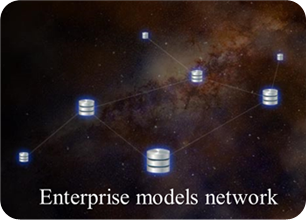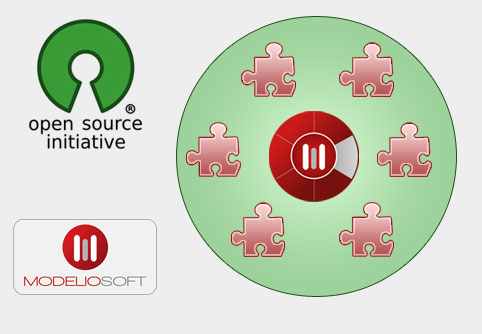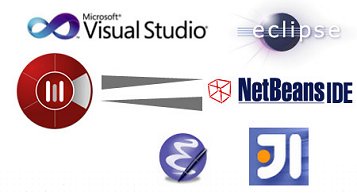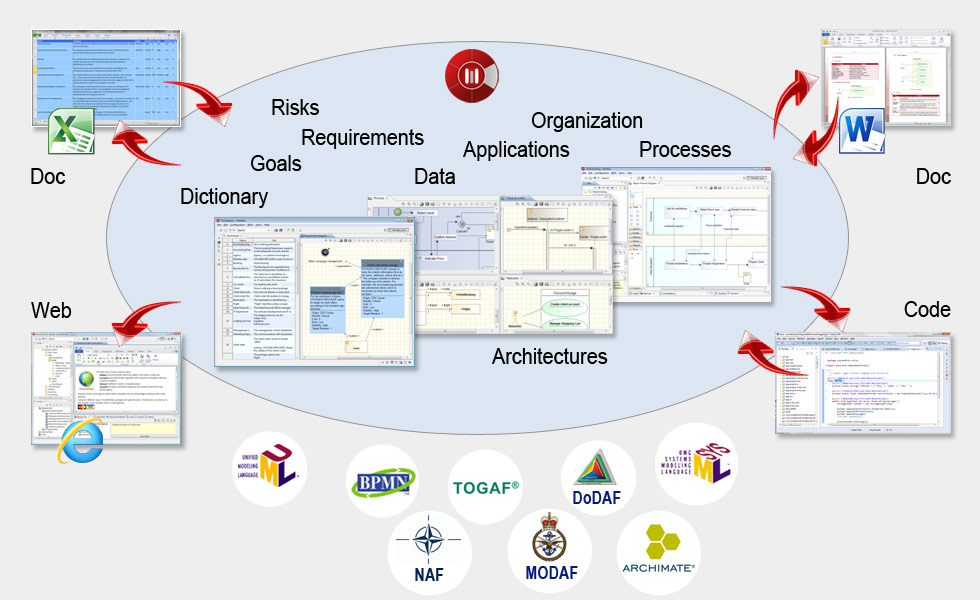
Thursday, November 20, 2014 (17h - 18h CET)
Models in an Enterprise are parceled between different repositories, tools or Business Units. That model separation hinders the exploitation, the generalization and the reuse of models. The knowledge asset (models, processes, data, architectures, systems) is therefore poorly shared and exploited.
The new Modelio Constellation tool ensures the models and projects governance, as well as their centralized administration, the setting of indicators and procedures, and the setting of automated tasks : reports, audits and code generation, continuous integration. Constellation organizes and ensures the sharing of models within and between organizations, even for the most heterogeneous ecosystems. Its web administration interface provides a convenient tool to manage and get a synthesis of projects.
Connected to the Modelio « World Wide Modeling » technology, Modelio Constellation enables the models management for the most complex situations: complex models, multi projects, users rights management, large companies, ecosystems and any kind of federated organization.
Similar to the web, Modelio World Wide Modeling enables Models to be easily accessible and shareable.
Modelio 3 supports real genuine enterprise repositories, shared by all stakeholders, structured into expertise and domains, open to external partners. Then, your models become a precious asset of the company, that enables knowledge management.
This event is finished. Below, you can view the videos of the webinar.
Video - Presentation of: "Modelio constellation - Model repositories at the Enterprises and Systems scale
Video - Constellation demo
www.modelio.org is the Modelio open source site.
Modelio is distributed under the GPL OSS license.
There are also many open source Modules. Their OSS License depends on the Author.
Anyone can create a Modelio module, and publish it as an open source module, or defined his own private or commercial Module. The module related framework within Modelio is distributed under the Apache license (one of the most permissive license.).
UC1: Company with subcontractors
Subcontractors are not obliged to buy licenses to work with a Modelio client company. They can stay with the open source version.
UC2: Sharing know-how, methodologies, generators, and model driven frameworks.
Once you have customized Modelio for a specific domain, methodology, or framework, you might want to share it with third parties, without forcing them to buy Modelio licenses. The open source distribution gives you the freedom to disseminate your knowledge without any constraints from Modelio.
UC3: Getting open source extensions in your environment
Check out the Modelio Store and see if there are useful extensions for you, or get extensions from partners.

Modelio products integrate directly with existing coding habits and environments, such as Eclipse or Visual Studio. This allows developers to continue using their favorite IDE to make changes to code, with Modelio products taking care of retrieving changes in the code and updating the UML model accordingly.

Each language comes with its own standards, such as MFC/STL libraries for C++ and Java 6, C++/CLI standards for .Net developers, and so on. Modelio products provide specific features to enable developers to take advantage of these technologies and intuitively work with them from the model.
Modelio products automatically manage model/code consistency. They allow developers to work in model-centric mode ("model driven") or code-centric mode using popular IDEs ("roundtrip"). Changes at model level will be automatically reflected in the code and vice-versa.
Modelio products can generate project buildfiles for Java, C++, C# and other languages. They can also generate the project environment for different IDEs, including Eclipse and Visual Studio.
Development teams often use a continuous integration approach. To fit with this approach, Modelio tools help build Jython scripts that can launch large code generation and project building processes in batch mode.

Whatever your documentation needs, Modelio products provide the quality document generation features you need.
The Modelio Document Publisher module is able to automatically generate high quality documents from models, raising productivity and saving time. These documents respect enterprise quality rules through dedicated document templates and are guaranteed to be in sync with their respective models at all times.
Generated documents can include glossaries, traceability matrices and diagrams, all of which are kept in perfect sync with model element names and descriptions. Enterprise-specific styles and rules can be applied to documents, relieving users of the burden of repetitive and error-prone tasks.
Modelio products allow text annotation to be embedded within models and managed within the Modelio repository. Each model element can have its own description, which can be one of several different types, displayed in diagrams, or captured in specific windows. This provides live documentation attached to the model.
Modelio integrates the editor of your choice (MS-Word, LibreOffice, …) into your Modelio environment, enabling you to enter rich text with your models. In this way, Modelio provides powerful support for analyst wishing to work simultaneously on models and their descriptions, and to produce documents assembled using the document templates of their choice, in either MS-Word, LibreOffice or HTML format (using the "Document Publisher" module). The entire Microsoft Office toolsuite is supported, with PowerPoint presentations or Excel™ tables able to be included in your documents.
The Modelio Document Publisher module comes with a large set of predefined templates that support many document types, including analysis or design documents, requirement analysis and use case documents. This simplifies common document generation tasks and reduces time spent in preparing documentation.
The Modelio document template editor makes it possible to define custom document templates with absolutely no programming knowledge. This makes it possible to adapt the style and presentation of documents to fit enterprise standards, and apply enterprise quality standards throughout the modeling and development lifecycle.